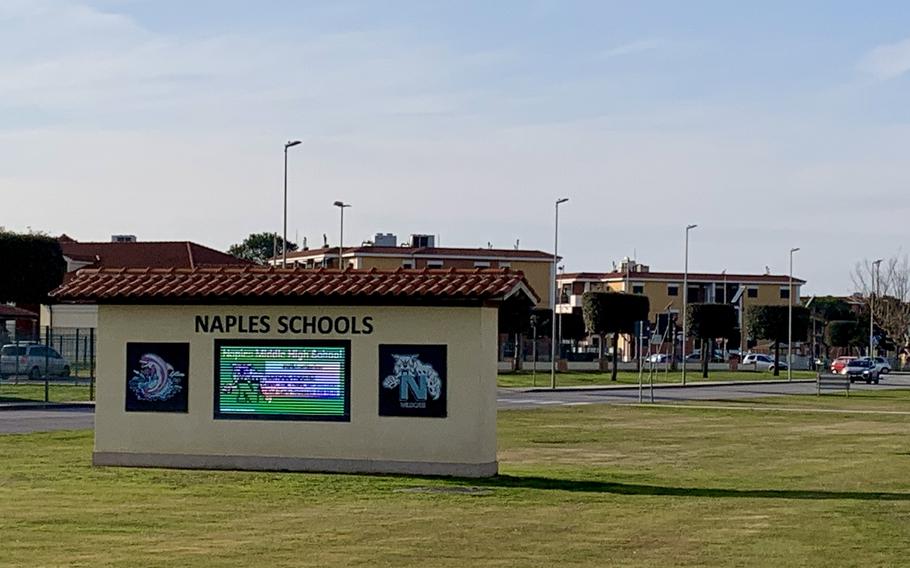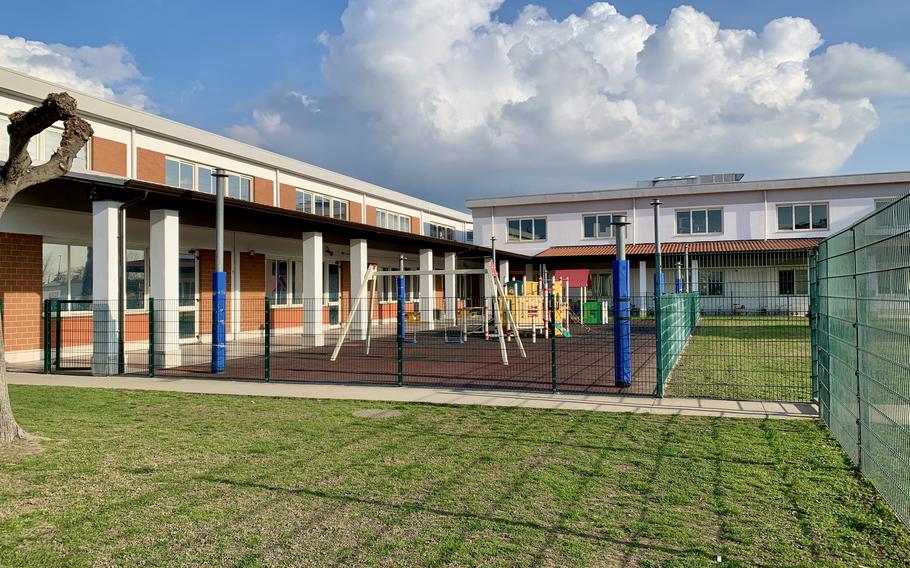
Some parents of children attending Naval Support Activity Naples Elementary School in Italy say violent bullying and the use of racial slurs on campus are not being dealt with adequately. Officials with the Department of Defense Education Activity say privacy laws prohibit them from discussing specific incidents. (Alison Bath/Stars and Stripes)
Editor’s note: This report includes sensitive language.
NAPLES, Italy — Bullying at a Defense Department elementary school that includes serious injuries and racial slurs is raising concern among parents who say administrators haven’t adequately addressed threats to their children’s safety.
Recent unprovoked acts, including one that left a child with a concussion and another with a broken nose, at Naval Support Activity Naples Elementary School are part of widespread student bullying across grade levels, parents said.
At least four military families told Stars and Stripes that the school hasn’t been transparent about the attacks or offered clear, helpful information about efforts to stop them.
“Here we are with an environment in the school that is actually, absolutely not conducive to children’s education,” said Sam Feltner, who recently withdrew one of his children from the school because of repeated unresolved bullying.
One other parent said they also were considering an early return to the U.S. because of bullying and racism at the school.
Parents also say the school didn’t inform them early enough that African American students were being targeted by other children asking them for an “N-word pass,” which purports to let them use the racial slur if permission is given.
Requests for the so-called pass have proliferated across social media and at stateside schools in recent years.
In another example, African American children were singled out in an activity called “chase the chocolate,” according to multiple parents.
Some parents learned about those problems only at a Jan. 22 meeting with three area superintendents that did not include local school administrators, they said. The meeting was scheduled to get parental input about school programs, but parents said they instead wanted to talk about bullying and racism.
Two assaults on separate children by the same student at the school have been properly reported and addressed in line with Department of Defense Education Activity policy, said Jessica Tackaberry, a spokeswoman for DODEA Europe.
“The safety of every individual student and staff is our top priority, and we are dedicated to maintaining a safe and respectful environment for everyone in our community,” Tackaberry said in a statement last week.

Some parents of students at the Defense Department elementary school at Naval Support Activity Naples in Italy say they are concerned about a potential gap in supervision when their children are at recess that could be contributing to bullying and racism on the playground. At least three monitors are on duty during lunch and recess periods, according to Department of Defense Education Activity officials. (Alison Bath/Stars and Stripes)
On Friday, the 779-student elementary school had an assembly that included topics such as attendance, character and bullying.
Counselors regularly conduct lessons about behavior, kindness and problem solving, and lessons can be adapted to address issues as they arise, Tackaberry said.
Administrators also recently sent students, parents and staff a text message about the use of racist language.
“Any student using such language will face formal disciplinary actions, as this behavior falls under discriminatory conduct,” the message said. It was also sent to high school students, parents and staff.
Feltner and other parents say that the actions thus far are inadequate, and that administrators cite DODEA policy protecting student privacy in refusing to discuss bullying at the school.
Those incidents include the multiple assaults by a student that appear to have escalated in intensity in recent weeks, as well as attacks by other children.
Administrators would not say how they were ensuring the safety of other students, particularly in the case of the student responsible for at least two assaults, said one parent on condition of anonymity because they feared retaliation.
“It just feels kind of like, ‘Oh, just trust us that we’re doing what we’re supposed to do,’ ” said the parent, who acknowledged the need for privacy of the children involved. “But when these things continue to happen repeatedly, it doesn’t feel that way.”
Problems with bullying and slurs aren’t new at the school but have grown recently, said Jennifer Crozier Culver, a parent who has been at NSA Naples for six years.
“I haven’t seen it (before) to this extent,” she said. “It’s like they just kind of push it underneath the rug, deal with it quietly and move on.”
DODEA policy divides disciplinary actions into two categories. The milder one uses de-escalation techniques, instructional strategies or similar methods, while exclusionary discipline may include suspension or expulsion.
But the policies don’t state specific consequences for conduct violations, such as fighting, or for repeated violations.
Those omissions are by design, Tackaberry said.
Educators must navigate complex factors, such as a student’s age, developmental level and situational environment.
Consequences that are “written in stone” don’t allow administrators the flexibility needed to effectively handle infractions, she said.
A 2020 Defense Department Inspector General report found that administrators at DOD schools worldwide didn’t report 600 serious peer-on-peer misconduct incidents to DODEA headquarters, base commanders or military security over a three-year period.
Those omissions occurred because DODEA policy gave administrators wide latitude on whether to report them to higher authorities or law enforcement, the report found.
DODEA policy requires that school administrators submit reports on serious incidents and accidental injuries.
However, it lacks examples of what constitutes “serious,” which is defined as “an alleged or suspected incident resulting in consequences greater than those normally addressed through routine administrative actions,” according to the policy posted on the DODEA website.
NSA Naples officials say they have no documentation of a Dec. 4 physical assault that left a student injured. That could be because the initial assessment didn’t reveal the injury, DODEA officials said.
A doctor later determined that the student had suffered a concussion. That finding was reported to elementary school administrators and base security, parents with knowledge of the situation said.
NSA Naples security forces did respond to a Jan. 29 assault that resulted in injuries, Lt. j.g. Valentine Mulango, a base spokesperson, said in a statement Feb. 18.
DODEA is working to refine reporting categories, study data and establish a student discipline guideline to reinforce consistency across its schools, Tackaberry said.
Feltner said the decision to remove his son from the school came after more than a year of asking administrators to address sexual orientation slurs, hitting, pushing and spitting directed at his son by a classmate. The bullying didn’t stop, and other children began joining in, Feltner said.
During a Jan. 21 meeting, Feltner, and his wife, Connie, say school officials told them that they were unable to prevent the bullying and that going to the superintendent wouldn’t make any difference.
The following day, the couple withdrew their son from the school and will leave NSA Naples ahead of their scheduled return date to the United States.
DODEA officials cited privacy laws in not being able to respond to Feltner’s comments.
The Feltners say they will look for a U.S. school that is able to provide the right environment for their son to learn and build friendships with his peers.
“I love my job. I truly do,” Feltner said. “But I love my children more.”